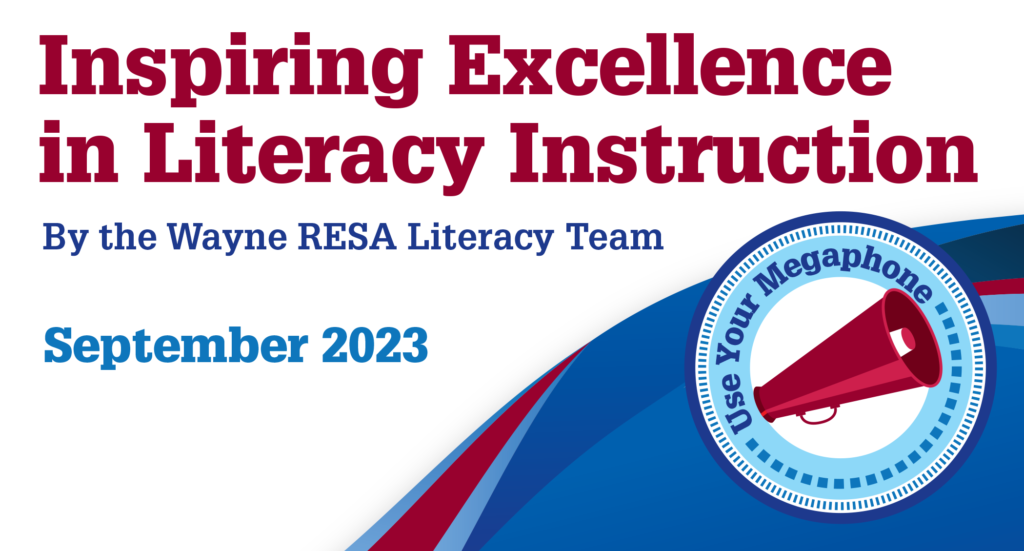
This newsletter has been created by Wayne RESA literacy consultants for literacy educators. In each issue, you will find Literacy Learning Network updates and information, statewide initiative updates, book synopses, teaching and coaching strategies, and upcoming professional learning opportunities. We look forward to partnering with you as we engage in best practices in literacy instruction for all students.
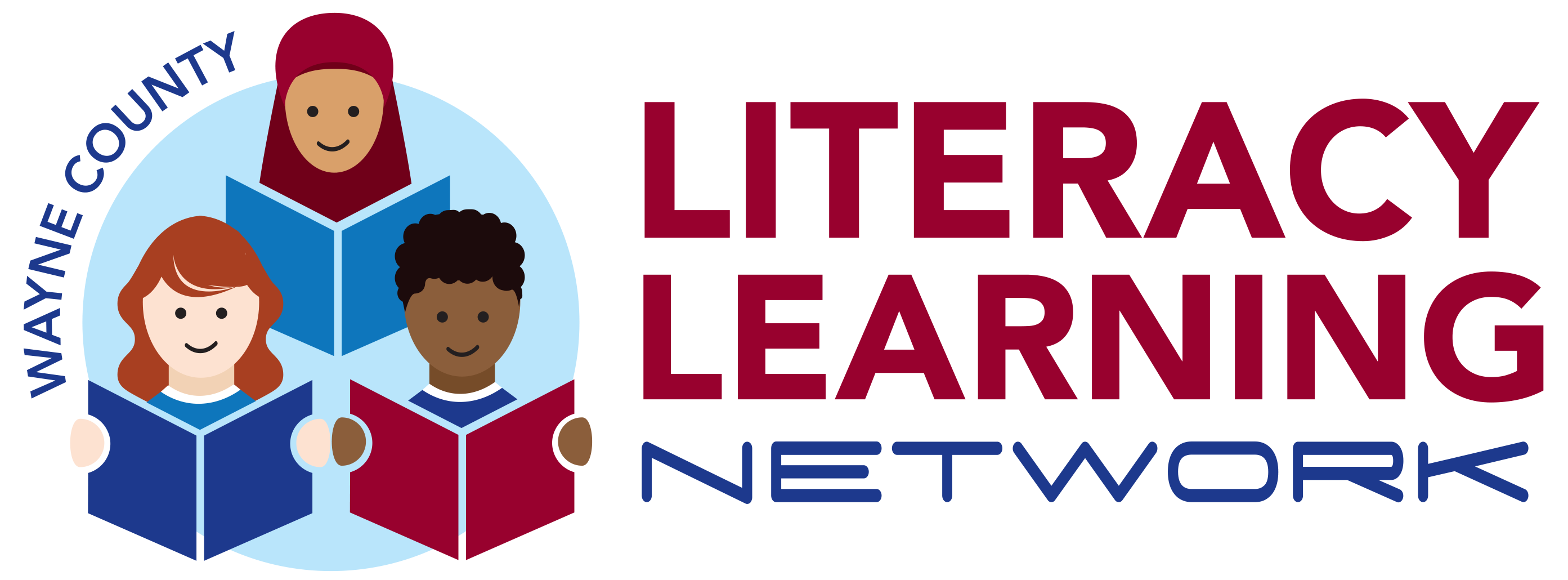
Literacy Learning Network Updates
Annual Summer Blitz Wrap-Up
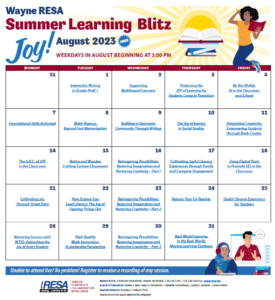
For the third consecutive summer, Michelle Wagner, Manager of Educational Services, has spearheaded this truly collaborative effort to bring professional learning directly to you–wherever you might be. This year, 2138 participants registered to attend sessions centered on rediscovering the sheer joy of teaching and learning. Topics appealed to educators from a variety of different disciplines, and each session was recorded for future viewings. A complete library of recorded sessions is now available on our Wayne County Literacy Learning Network YouTube channel and on our Wayne RESA Professional Growth page. To date, these videos have received over 1200 views! We hope that you will join us again next year for a month of inspiring and engaging sessions that reignite our desire to bring our best selves to the students and families we serve.
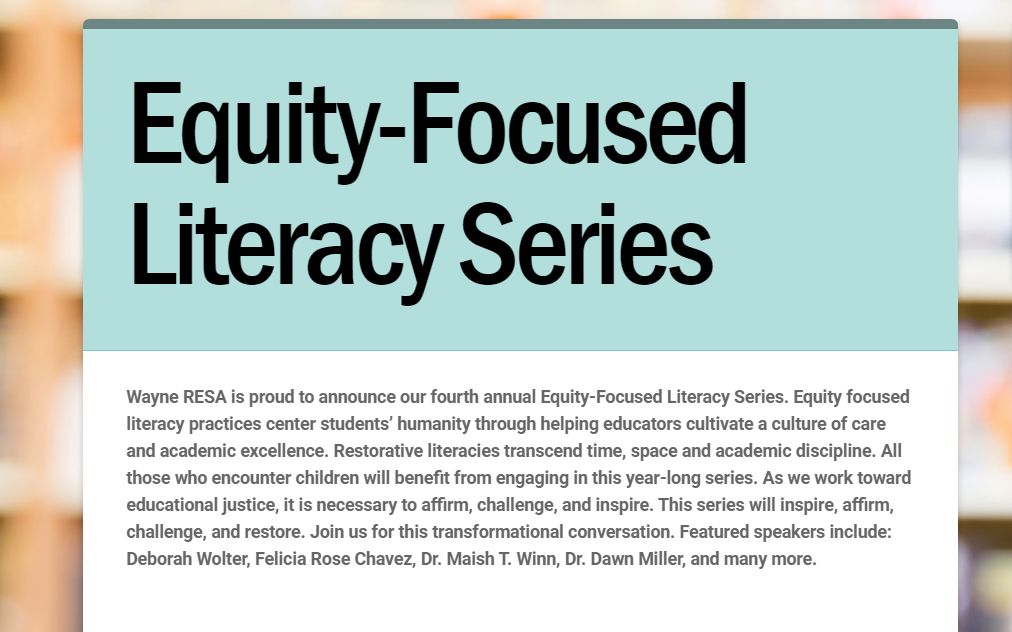
Equity-Focused Literacy Series
We are proud to announce our fourth annual Equity-Focused Literacy Series. With a focus on Restorative Literacies, the series begins on September 26th. Each session will feature a keynote speaker who will lend their expertise around equitable and restorative literacy practices that center students’ humanity by helping educators cultivate a culture of care and academic excellence. Restorative literacies transcend time, space, and academic discipline. During the first session, former literacy consultant and author Deborah L. Wolter will share stories from her book and discuss how restorative literacies expand our thinking about literacies to restore relationships between students and teachers as well as students’ relationships with literacies. Wolter will explain how centering the voices of students and educators can repair harm, strengthen agency, develop leadership and sustainability, and recognize literacies and identities. Register for Restorative Literacies: Creating a Community of Care to attend her session. Other featured speakers for the series include Felicia Rose Chavez, Dr. Maisha T. Winn, and Dr. Dawn Miller. In addition, Dr. Rosalyn Shahid and Heather Rottermond will lead participants in a four-session book study of Dugan and Safir’s Street Data. Any one of these opportunities will lead to introspective and transformative thinking, but since there are no limits, why not register for all?

Coaching Connections
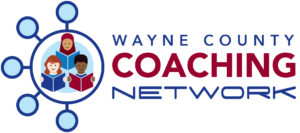
It is our hope this year to work more intentionally on coaching cycles as a way to build teacher capacity and to improve student outcomes. A coaching cycle is the process through which a teacher and instructional coach work collaboratively to set an instructional and/or student learning goal, make a plan for supporting the goal, monitor progress toward the goal, and then reflect on how well the plan supported the goal. Coaching cycles are typically 4-6 weeks long; during this time, the teacher and coach work together to increase student achievement by changing practice. It is important to document the goal, the plan, the evidence supporting implementation of the plan, and the reflection. There are several templates available online, such as the Effects of Coaching Cycles on Student Learning document created by the ISD Early Literacy Coaching Network, but we encourage you to modify any template to best suit your context.
Statewide Updates









Books and Strategies
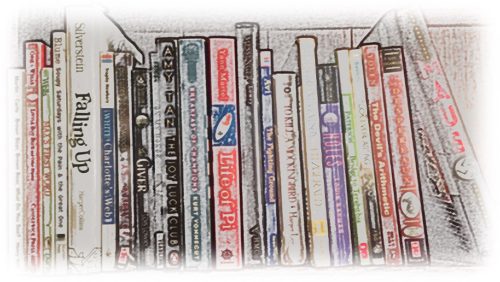
Book Talk
Abdul’s Story
Jamilah Thompkins-Bigelow
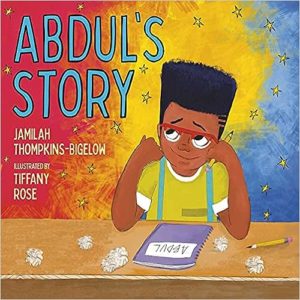 In this touching story by Jamilah Thompkins-Bigelow, Abdul is known by his friends as a storyteller. He cannot wait to share the details of his latest escapades as he and his classmates wait for the bus each day. Yet, when it comes to writing those stories down on paper, Abdul struggles. One day, a writer visits Abdul’s class and, armed with his own examples, he explains that writing can be a messy process. Inspired, Abdul embraces the messiness and begins to write the stories he loves to tell.
In this touching story by Jamilah Thompkins-Bigelow, Abdul is known by his friends as a storyteller. He cannot wait to share the details of his latest escapades as he and his classmates wait for the bus each day. Yet, when it comes to writing those stories down on paper, Abdul struggles. One day, a writer visits Abdul’s class and, armed with his own examples, he explains that writing can be a messy process. Inspired, Abdul embraces the messiness and begins to write the stories he loves to tell.
Hope Wins
A Collection of Authors, including R. L. Stine and Matt de la Peña
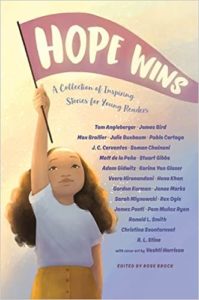 This is an anthology of short stories and essays written by popular children and young adult authors. These real life stories highlight that hope can be found anywhere and at any time, even when life feels bleak. Stories include characters with terminal illness, anxiety, autism, grief, and unreliable parents, just to name a few. The description by Penguin Random House states, “Where does hope live? In your family? In your community? In your school? In your heart? No matter what happens: Hope wins.” These stories would be powerful models for memoir or personal narrative writing.
This is an anthology of short stories and essays written by popular children and young adult authors. These real life stories highlight that hope can be found anywhere and at any time, even when life feels bleak. Stories include characters with terminal illness, anxiety, autism, grief, and unreliable parents, just to name a few. The description by Penguin Random House states, “Where does hope live? In your family? In your community? In your school? In your heart? No matter what happens: Hope wins.” These stories would be powerful models for memoir or personal narrative writing.
When Stars Are Scattered
Victoria Jamieson and Omar Mohamed
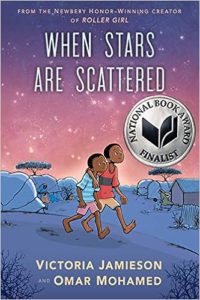
A national Book Award Finalist, this graphic novel is about two young boys who are being raised by an elderly neighbor in a refugee camp in Kenya. The main character Omar is given the opportunity to go to school, and he knows he needs to take it in order to improve his future; he and his brother rarely have enough food and have no medical care. His brother is nonverbal, so Omar also worries about leaving him all day to attend school. The story follows the day-to-day experiences of living in a refugee camp; there is heartbreak, hope, and humor throughout this book that keep the reader engaged in learning about life in Dabaab.
Hollow Fires
Samira Ahmed
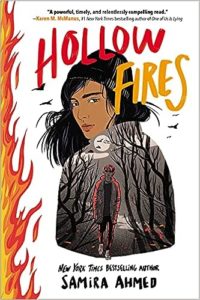 In this compelling mystery, Jawad Ali has gone missing. The fourteen-year-old son of Iraqi refugees had recently gained notoriety in the Chicago area because he brought a costume jet pack to school, which was mistaken for a bomb by his teacher. After an embarrassing arrest and subsequent school suspension, Jawad tries to fly under the radar at school, and suddenly, he is gone. Just a few miles away, Safiya Mirza, a high school senior, feels inextricably tied to Jawad. Her search for clues uncovers a sinister plot that threatens to endanger Safiya and those close to her. Undeterred, Safiya is determined to seek “justice for Jawad.”
In this compelling mystery, Jawad Ali has gone missing. The fourteen-year-old son of Iraqi refugees had recently gained notoriety in the Chicago area because he brought a costume jet pack to school, which was mistaken for a bomb by his teacher. After an embarrassing arrest and subsequent school suspension, Jawad tries to fly under the radar at school, and suddenly, he is gone. Just a few miles away, Safiya Mirza, a high school senior, feels inextricably tied to Jawad. Her search for clues uncovers a sinister plot that threatens to endanger Safiya and those close to her. Undeterred, Safiya is determined to seek “justice for Jawad.”
Teaching Black Boys in the Elementary Grades
Alfred W. Tatum
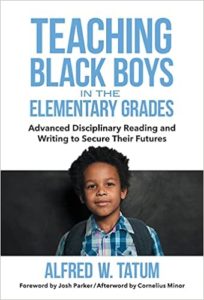 In a recent professional learning session, Dr. Tatum emphatically divulged that “all texts belong to Black boys.” In his recently published book, he outlines seven pathways to nurturing and sustaining a sense of belonging for Black boys, such as developing a “passion for ideas” and allowing time for “voracious reading” and writing. Tatum’s multidisciplinary approach, couched within a supportive and caring environment, centers students’ identity and collaboration as inroads to academic engagement and success.
In a recent professional learning session, Dr. Tatum emphatically divulged that “all texts belong to Black boys.” In his recently published book, he outlines seven pathways to nurturing and sustaining a sense of belonging for Black boys, such as developing a “passion for ideas” and allowing time for “voracious reading” and writing. Tatum’s multidisciplinary approach, couched within a supportive and caring environment, centers students’ identity and collaboration as inroads to academic engagement and success.
AI for Educators
Matt Miller
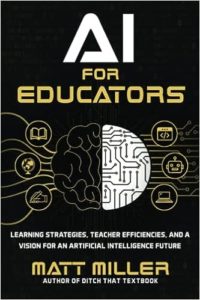 In his opening vignette, Matt Miller, author of Ditch That Textbook, describes his introduction to ChatGPT in December 2022–less than one year ago. Miller cites Brockman (2022) and Hu (2023), who note that within five days, ChatGPT had 1 million users, and two months later, that number hovered closer to 100 million. Clearly, the general public has embraced AI, but where does that leave the educational world? Miller carefully articulates the growing shifts for teachers and learners along with plans for using AI in the classroom.
In his opening vignette, Matt Miller, author of Ditch That Textbook, describes his introduction to ChatGPT in December 2022–less than one year ago. Miller cites Brockman (2022) and Hu (2023), who note that within five days, ChatGPT had 1 million users, and two months later, that number hovered closer to 100 million. Clearly, the general public has embraced AI, but where does that leave the educational world? Miller carefully articulates the growing shifts for teachers and learners along with plans for using AI in the classroom.
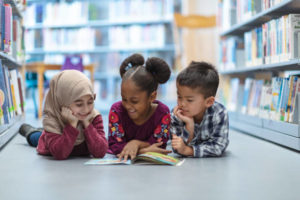
Say Good-Bye to Independent Reading & Hello to Interdependent Reading
Independent reading has long been a part of many students’ days. This practice usually involves students reading text on their own with minimal or no assistance from other students or adults. Recently, however, you may have noticed that in Essential 8 of the Essential Instructional Practices for K-3 from MAISA GELN, the word independent was excluded from the last bullet, and it now reads:
Opportunities for children to engage in the reading of materials of their choice every day, with supports that include: a) instruction and coaching in how to select texts, b) instruction and coaching in employing productive strategies during reading, c) feedback on children’s reading, and d) post-reading response activities, including text discussion.
Educators may wonder if they should eliminate independent reading from their school day. In a recent presentation entitled From Independent Reading to Interdependent Reading, Dr. Nell Duke shared that currently, research has not shown that independent reading has a significant impact on reading achievement. This, however, does not mean that students shouldn’t be allowed to read materials that they choose, but rather that they should be supported in their reading by peers and teachers so that precious educational time is used to increase students’ achievement in reading. This shift would be considered interdependent reading.
Interdependent reading scaffolds students by providing strategies and practices that help them develop a purpose for reading, activate prior knowledge, read actively for meaning, and reflect on text when they have finished reading. The teacher is using the time when students are reading as teaching opportunities. The following are examples of practices that could be utilized when thinking about interdependent reading:
- Have students choose books on topics they will be studying throughout the day. As they read, let them know that they will have an opportunity to share interesting facts on the topic during that time. Have students tag in their book or write down information they want to share.
- Chunk text for students into meaningful sections where they can make predictions, read, and then discuss what they have read with peers and teachers.
- Involve students in book clubs/literature circles where they have a specific purpose for reading.
If you would like support in thinking about ways to shift your practice from independent reading to interdependent reading, please reach out to one of the Wayne RESA Literacy Team members. We would love to support you with this practice.
Noteworthy News

The Michigan eLibrary, also known as MeL, offers eResources for all Michigan residents. These resources can be used in school on any device, and they are easy to navigate to. Below is a list of some of the resources you can find for students on MeL:
K-5
- Pebble Go
- World Book Kids
- Britannica for PreK-2 and 3-4
- eBooks K-8
- Explora for Elementary School
- Enciclopedia Estudiantil Hallazgos
6-12
In addition to the resources, MeL offers online training so educators can effectively use the programs with their students. You can explore the Michigan eLibrary for Educators here.
Professional Learning
| Upcoming Events at Wayne RESA |
See our new interactive 2023-2024 Wayne RESA Course Catalog for links to course offerings, their descriptions, and online registrations in Learning Stream. Simply click on the catalog link above, and then click on Literacy in the Table of Contents to peruse our offerings. Don’t forget to check for interdisciplinary offerings by clicking on additional content areas. Many of our professional learning events will continue to be offered virtually. If the format for a session or series is unclear, please contact any of the Literacy Team members for details. NEW! Supporting the Upper Elementary Reader: Join a community of educators from Wayne County in thinking and learning about effective literacy practices in the upper elementary grades. This series aims to actively promote equity within the classroom so that all students have the resources and support they need to succeed. Over the course of the year, participants will have the opportunity to sign up to learn about four different topics:
Each topic will be discussed for two weeks, allowing participants to try new practices between and after each session. Participants will leave with routines, strategies, and activities that they can use immediately within the classroom. |
AI Resources: Embracing the Possibilities


Wayne RESA Literacy Team
Michelle Wagner, Manager of Educational Services
Mari Treece, Executive Director of Educational Services
If this newsletter has been forwarded to you, and you’d like to subscribe to it, please contact Laura Gabrion.
![]() 33500 Van Born Road • Wayne, MI 48184 • 734.334.1300 • 734.334.1620 fax • www.resa.net
33500 Van Born Road • Wayne, MI 48184 • 734.334.1300 • 734.334.1620 fax • www.resa.net
Board of Education
James S. Beri • Mary E. Blackmon • Danielle Funderburg • Lynda S. Jackson • James Petrie
Daveda Colbert, Ph.D., Superintendent
2023 September “Use Your Megaphone”: Inspiring Excellence in Literacy Instruction Read More »